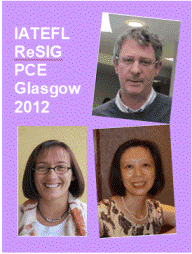21 May - 1 June 2012: Article Discussion: Materials development for language learning and teaching14/5/2012
 Article Discussion: 'Materials development for language learning and teaching’ Date: 21 May - 1 June 2012 Article: 'Materials development for language learning and teaching', by Brian Tomlinson Guest moderator: John Gray, Institute of Education, University of London. Location: ReSIG YahooGroup Download article here This event is open to ReSIG members and non-members. You can join our YahooGroup for free here. How to participate:
- Join our YahooGroup at the link above. if you're not a member yet. - Download the article at the link above. - Read the article. - To help you get ready for the discussion, here are some possible questions, suggested by John, apart from ones you might have of your own: 1. Do you agree with the suggestion that for materials development to become more credible, it needs to become more empirical? If so, which areas would you identify as being in need of research? 2. Tomlinson’s paper – in line with the tendency of much of the materials literature – is focused mainly on materials evaluation rather than materials analysis. From a research perspective, how do you view this tendency? 3. What is the best way to go about evaluating materials - given the proliferation of checklists and frameworks for materials evaluation, and even, as reported here, a set of questions to evaluate such instruments? 4. Given that most good teachers are said to engage in materials adaptation, what avenues for research do you see in this area? 5. The article points out that few academic theorists and researchers are actually involved in materials writing – although there have been exceptions in the past (e.g. Stephen Pit Corder) and in the present (Mike McCarthy). Who should write materials in your view? 6. What do you see as the relevance of corpus descriptions of language to materials writing – particularly with regard to materials for use in your own setting? 7. The paper suggests that both initial and in-service teacher education could do more to facilitate a move away from reliance on textbooks. Do you agree with this suggestion and, if so, how might it be facilitated? 8. The article mentions the uses of new technologies (e.g. mobile phones) in making language learning materials available to students. What kinds of research do think need to be undertaken to explore the actual affordances of new technologies for materials development? 9. In one study carried out in three countries Tomlinson reports that 92% of the teachers consulted regularly used a coursebook and that 78% of them were negative about coursebooks. How can this be explained? 10. In the section on ideology in materials, Tomlinson suggests that it is important for teachers and materials writers to develop ‘constructive criticality’ – do you agree, and if so, how might this be done?  How to Combine Teaching and Researching: Focus on Learners and Classroom Language Learning (Pre-Conference Event) Date: 19 March 2012 (10am to 5pm) Presenters: Ema Ushioda (University of Warwick), Richard Smith (University of Warwick) and Sarah Mercer (University of Graz). Location: Glasgow, UK. NEW!: Resources from the event (ppts, handouts, photos of posters etc.) . NEWER! Feedback and further discussion opportunities. NEWEST! Blog post about the event by a participant, Edward Russell Our 2012 PCE explored how teaching and researching can interact with one another in fruitful ways, and discussed practicable methods that teachers may like to consider using for research in their own classrooms.
This was the first in a planned series of Research SIG events on Teaching-and-Researching. This was intended to be a practical workshop designed for teachers who are thinking of doing classroom research (for whatever reason), of interest also to postgraduate students who are planning to combine teaching and researching roles. Through a combination of input, discussion and hands-on tasks, we considered the following:
|
AuthorWelcome to IATEFL ReSIG blog! Archives
September 2015
|
 RSS Feed
RSS Feed